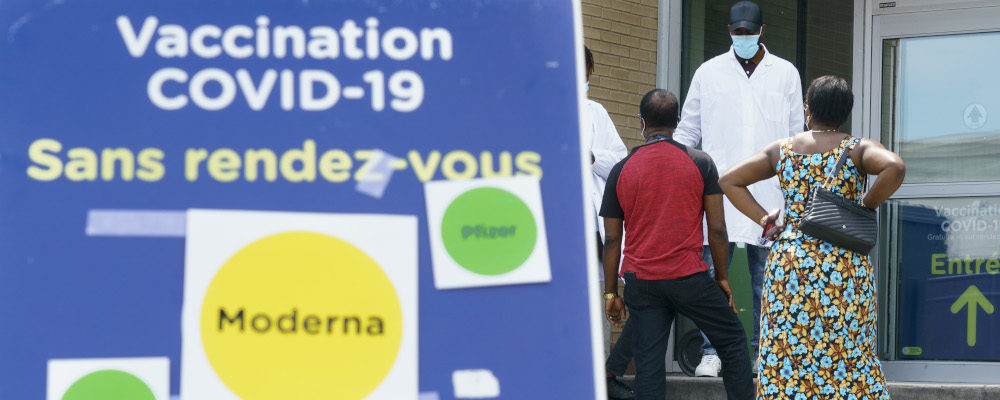Canada is finally reaching highly protective levels of full vaccination. Why then do we need to consider whether booster shots may still be needed this year?
All approved vaccines have high levels of protection against hospitalization and death, their most important benefit. It therefore is not surprising that almost all hospitalizations and deaths in the U.S. and Canada are now occurring in those inadequately vaccinated (85 percent of bad outcomes are in those foregoing vaccination and the rest in those not fully vaccinated).
MORE SIGNAL. LESS NOISE. THE HUB NEWSLETTER.
Vaccine protection comes in two important ways namely antibody production and memory T-cells. The most immediate protection is the vaccine antigen-induced production of antibodies able to bind and neutralize the viral spike protein.
These antibodies rapidly develop after vaccination and await exposure to the SARS-CoV-2 virus. If exposed they then neutralize the virus by binding to its spike protein, restricting cell entry via the ACE2 receptor thus preventing further replication and cell damage.
Antibody levels are easy to measure and have been shown to increase dramatically following a second vaccine dose. Maximum protection is achieved about two weeks after the second shot. Vaccine induced antibody levels are lower in older people and those who are immune compromised. Antibody levels also decay over time both from natural infection and following vaccination.
The key issue is at what point the decay in antibody levels reaches a critical threshold whereby adequate protection from infection and its complications is of concern.
The mutation of the virus into more infectious and dangerous variants of concern (VOC) has also made it more resistant to vaccine induced spike protein antibodies as they work best to neutralize the original rather than the mutated form of the viral spike protein.
The mRNA vaccines had about 95 percent reduction of infection risk for the original strain (almost complete protection against death) and only about 88 percent for the now dominant Delta VOC.
Recent Israeli data shows further slippage of protection over time in their early vaccinated population with recent 93 percent effectiveness against serious infection and 64 percent against breakthrough infection.
There is currently very little Delta plus (Delta plus an additional spike protein mutation) or Lambda VOC disease in North America and we don’t yet know if this will be a further issue (but hopefully not).
The combination of lower antibody production in some vulnerable groups, natural decay of levels over time and lower specificity and effectiveness in targeting VOCs has raised concerns about when vaccine boosters may be required to further ramp up antibody levels.
Pfizer has already requested emergency-use authorization from the FDA to approve the use of a booster for a third vaccination dose in vulnerable people. While a modified vaccine targeting the Delta variant is being developed and tested, the proposed initial booster would be the current vaccine since in trials this has been shown to further increase antibody levels by a factor of five to 10 times against the Beta variant and likely also as effective against the Delta variant.
The proposed need for booster shots has raised concerns about pharmaceutical companies hyping the shot for financial reasons. As well there is concern particularly in the U.S. that talk of boosters will further increase vaccine hesitancy which is already a major risk for a developing fourth wave.
Current complication rates for vaccine induced blood clots, myocarditis and now Guillain Barre, a neuromuscular syndrome recently rarely associated with the Johnson & Johnson vaccine are low enough to still recommend primary vaccination for everyone. It is not clear whether these risks are amplified following a booster shot. The risk benefit almost certainly favours booster shots in high risk people at some point but not necessarily in low risk groups.
As always decisions about the need and timing of booster shots requires us to follow the science which is not yet mature. Studies of efficacy and safety of boosters are being carried out both by the manufacturers and independent bodies. Israel and France have allowed emergency use of boosters in highly-compromised people such as those who have received donor organs or cancer therapy. Other countries may follow their lead.
For now disease levels are low in North America, vaccines remain highly effective against all VOCs and boosters are not yet necessary except possibly for those at highest risk. As well our adaptive humoral based immunity from memory T-cells may provide longer protection even if antibody levels decline.
It is hopeful that if boosters are needed, for most people it would be offered a year or more after initial full vaccination. For those over 60 with risk factors it may be sooner. It is too early to be certain about timing and it awaits the outcome data and whether case rates start to rise dramatically in vaccinated people.
The boost we currently need is from life returning to a more normal level and focusing on primary vaccination for as many people as possible all around the world. We have to trust that the worldwide regulatory agencies will review the science as it becomes available and advise on when, if, and in whom booster shots may ultimately be appropriate.
Let’s hope our government has secured early options for them if needed.




